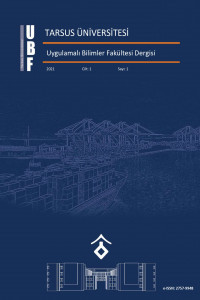GELİŞMEKTE OLAN ÜLKELERDE ENERJİ VERİMLİLİĞİ, YENİLENEBİLİR ENERJİ VE EKONOMİK BÜYÜME ETKİLEŞİMİNİN TEST EDİLMESİ
Bu çalışmada, 22 ülkeyi (Arjantin, Brezilya, Şili, Çin, Hindistan, Endonezya, Ürdün, Malezya, Meksika, Nijerya, Pakistan, Peru, Filipinler, Polonya, Romanya, Rusya, Güney Afrika, Tayland, Tunus, Türkiye, Ukrayna, Uruguay) dikkate alarak enerji verimliliği ile yenilenebilir enerji tüketiminin ekonomik büyüme üzerindeki etkileri Westerlund (2007) eşbütünleşme ve Dumitrescu ve Hurlin (2012) nedensellik testleri kullanılarak 1990-2014 dönemi için araştırılmıştır. Elde edilen eşbütünleşme testi sonuçları değişkenler arasında uzun dönemde herhangi bir ilişki olmadığını ortaya koymuştur. Dumitrescu ve Hurlin (2012) nedensellik testi sonuçları ise kısa dönemde enerji verimliliği ile ekonomik büyüme ve yenilenebilir enerji ile ekonomik büyüme arasında çift yönlü nedensellik ilişkisi olduğunu göstermiştir.
Anahtar Kelimeler:
Ekonomik Büyüme, Enerji Verimliliği, Yenilenebilir Enerji
___
- Avrupa Komisyonu Teknik Raporu. (2014). Energy efficiency and its contribution to energy security and the 2030 framework for climate and energy policy. https://ec.europa.eu/energy/sites/ener/files/documents/2014_eec_communication_adopted_0.pdf. Erişim Tarihi: 01.02.2020
- Balitskiy, S., Bilan, Y., Strielkowski, W., & Štreimikienė, D. (2016). Energy efficiency and natural gas consumption in the context of economic development in the European Union. Renewable and Sustainable Energy Reviews, 55, 156-168.
- Bayar, Y., & Gavriletea, M. D. (2019). Energy efficiency, renewable energy, economic growth: evidence from emerging market economies. Quality & Quantity, 53(4), 2221-2234.
- Bhattacharya, M., Paramati, S. R., Ozturk, I., & Bhattacharya, S. (2016). The effect of renewable energy consumption on economic growth: Evidence from top 38 countries. Applied Energy, 162, 733-741.
- Breusch, T. S., & Pagan, A. R. (1980). The Lagrange multiplier test and its applications to model specification in econometrics. The review of economic studies, 47(1), 239-253.
- Doğan, H., & Yılankırkan, N. (2015). Türkiye’nin enerji verimliliği potansiyeli ve projeksiyonu. Gazi Üniversitesi Fen Bilimleri Dergisi Part C: Tasarım ve Teknoloji, 3(1), 375-384.
- Dumitrescu, E. I., & Hurlin, C. (2012). Testing for Granger non-causality in heterogeneous panels. Economic modelling, 29(4), 1450-1460.
- Dünya Bankası. (2020). World Bank Development Indicators, https://databank.worldbank.org/source/world-development-indicators. Erişim Tarihi: 02/02/2020
- Ganda, F., & Ngwakwe, C. C. (2014). Role of energy efficiency on sustainable development. Environmental Economics, 5(1), 86-99.
- Indrawati, S. M. (2015). Energy and sustainable development: What’s next?. http://www.world bank.org/en/news/ speec h/2015/06/10/energy-and-sustainable-development-whats –next. Erişim Tarihi: 02/02/2020
- International Energy Agency (IEA). (2017). Energy access outlook. From poverty to prosperity world energy Outlook special report 2017. https ://www.goggle.org/sites /default/files /resource_docs/weo20 17special report energyaccessoutlook.pdf. Erişim Tarihi: 01/02/2020
- International Energy Agency (IEA). (2018). Energy efficiency is the cornerstone for building a secure and sustainable energy system. https ://www.iea.org/newsr oom/news/2018/octob er/energy-efficiency-is-the-answer-for-building-a-secure-and-sustainable-energ sysyst.html (2018).
- Kahia, M., Aïssa, M. S. B., & Lanouar, C. (2017). Renewable and non-renewable energy use-economic growth nexus: The case of MENA Net Oil Importing Countries. Renewable and Sustainable Energy Reviews, 71, 127-140.
- Karakaya, H. (2017). Enerji Verimliliği Kapsamında Türkiye’nin Enerji Tüketimi İle Ekonomik Büyümesi Arasındaki Nedensellik İlişkisinin Değerlendirilmesi. Kastamonu University Journal of Economics & Administrative Sciences Faculty, 16(2), 26-39.
- Marinaș, M. C., Dinu, M., Socol, A. G., & Socol, C. (2018). Renewable energy consumption and economic growth. Causality relationship in Central and Eastern European countries. PloS one, 13(10), e0202951.
- Niu, J., Chang, C. P., Yang, X. Y., & Wang, J. S. (2017). The long-run relationships between energy efficiency and environmental performance: Global evidence. Energy & Environment, 28(7), 706-724.
- Pesaran, M. H. (2004). General diagnostic tests for cross-sectional dependence in panels. Empirical Economics, 1-38.
- Pesaran, M. H. (2006). Estimation and inference in large heterogeneous panels with a multifactor error structure. Econometrica, 74(4), 967-1012.
- Pesaran, M. H. (2007). A simple panel unit root test in the presence of cross‐section dependence. Journal of applied econometrics, 22(2), 265-312.
- Pesaran, M. H., & Yamagata, T. (2008). Testing slope homogeneity in large panels. Journal of econometrics, 142(1), 50-93.
- Pesaran, M. H., Ullah, A., & Yamagata, T. (2008). A bias‐adjusted LM test of error cross‐section independence. The Econometrics Journal, 11(1), 105-127.
- Polat, B. (2018). The impact of renewable and nonrenewable energy consumption on economic growth: a dynamic panel data approach. Asia-Pacific Journal of Accounting & Economics, 1-12.
- Rajbhandari, A., & Zhang, F. (2018). Does energy efficiency promote economic growth? Evidence from a multicountry and multisectoral panel dataset. Energy Economics, 69, 128-139.
- REN21. (2018). Renewables 2018 global status report. http://www.ren21. net/wp-conte nt/uploa ds/2018/06/17-8652_ GSR20 18_FullR eport web_final .pdf. Erişim: 05/02/2020
- Sinha, A. (2015). Modeling energy efficiency and economic growth: evidences from India. International Journal of Energy Economics and Policy, 5(1), 96.
- Tekkol B., & Aydın C. (2019). Enerji Tüketiminin Ekonomik Büyüme Üzerindeki Etkisinde Enerji Verimliliğinin Rolü: Türkiye Örneği, II. International Conference on Empirical Economics and Social Sciences, 21-22 Haziran. Bandırma.
- Westerlund, J. (2007). Testing for error correction in panel data. Oxford Bulletin of Economics and statistics, 69(6), 709-748.
- Yayın Aralığı: Yılda 2 Sayı
- Başlangıç: 2021
- Yayıncı: Tarsus Üniversitesi
Sayıdaki Diğer Makaleler
ENDÜSTRİ 4.0’IN DİJİTAL PAZARLAMAYA ETKİLERİ
Dilara DEMİREZ, Duygu GÜR, Eda YAŞA ÖZELTÜRKAY
SERBEST TİCARET ANLAŞMALARININ TÜRKİYE’NİN SEKTÖREL İHRACATINA ETKİSİ: ÇEKİM MODELİ
YOLSUZLUK ALGI ENDEKSİNE GÖRE TÜRKİ CUMHURİYETLERİN DURUMU: GELİŞMELER, SORUNLAR VE ÖNERİLER
